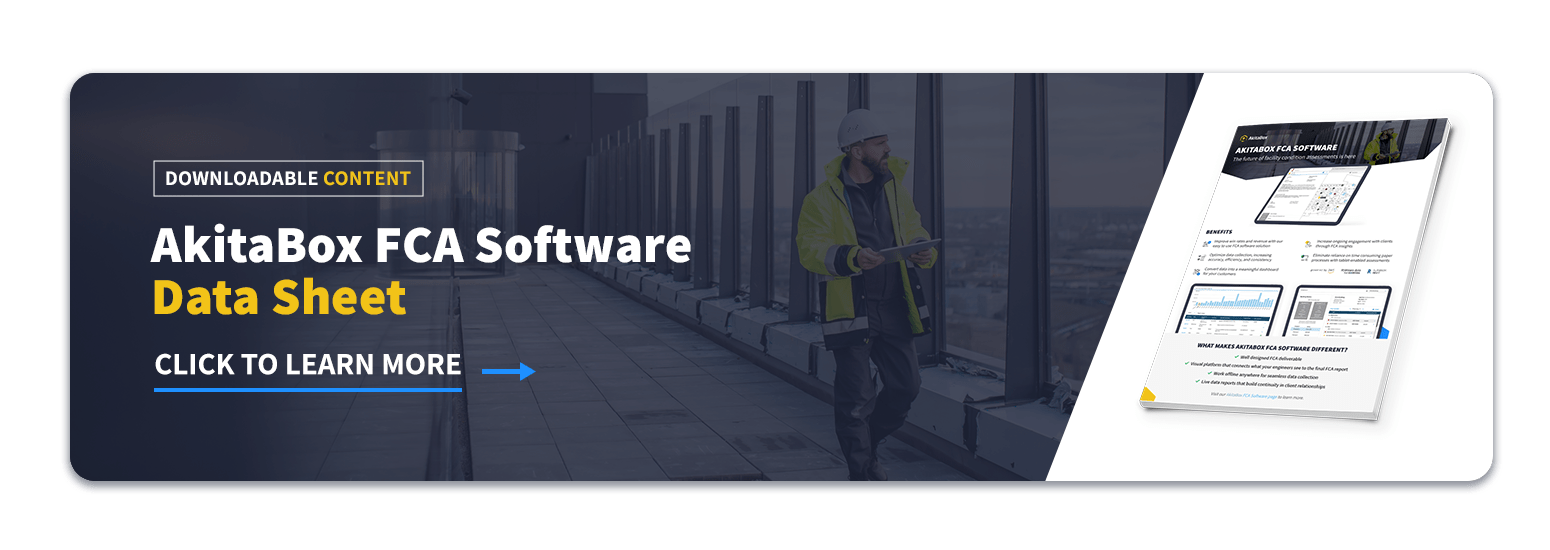CNA, BCA, PCA – spend enough time around facility condition assessments and you’ll come across a number of acronyms and names that describe comprehensive property surveys.
And while the various names are somewhat interchangeable, each term does have some key differences. So let’s jump in.
The Many Names of Facility Assessments
-
Building Condition Assessment
-
Capital Needs Assessment
-
Deferred Maintenance Study
-
Property Condition Assessment
Building Condition Assessment (BCA)
This is probably the closest synonym to a facilities condition assessment (FCA). Just like an FCA, a BCA indicates what repairs you need to do in the short-term and recommends longer-term repairs along with their estimated costs.
The process involves taking photos and preparing documentation on each component, including any deficiencies. It also typically incorporates information from repair and maintenance histories, and interviews with facilities and maintenance staff.
More specifically, a building condition assessment evaluates the current condition of:
- Site and grounds (pavement, loading docks, exterior lighting, walls, fencing/railings, etc.)
- Structural systems (foundations and structural framing of walls, roofs)
- Building envelope (roofing, exterior doors, windows, etc.)
- Mechanical systems (electrical, ventilation, air conditioning, plumbing, etc.)
- Interior building components
- Regulatory compliance of life safety and fire suppression systems
The final report shows what needs to be repaired, replaced, or upgraded to conform to industry standards. It estimates the remaining lifespan of the building’s elements and systems. In addition, it includes a list of recommended repairs or replacements and their estimated costs.
Read More: A Brief History of the Facility Condition Assessment

Capital Needs Assessment (CNA)
Otherwise referred to as a physical needs assessment, or a Project Capital Needs Assessment (PCNA), a CNA estimates the costs of maintaining a building over time. It includes cost estimates for repairing any urgent needs as well as the future costs of ongoing property maintenance.
A CNA examines all of a building’s major systems (such as insulation, plumbing, electrical, roofing, etc.) to determine each system’s expected remaining lifetime, and how soon they’ll likely need to be repaired or replaced.
Think of it as a road map of the life expectancy and cost of major items needed to maintain your property. A CNA report outlines any urgent fixes and helps you better budget for predicted replacement costs.
Deferred Maintenance Study
Another term for this type of assessment is backlog study. Whatever you prefer to call it, a deferred maintenance study puts more emphasis on determining the size of your maintenance backlog and what it will take to clear it.
A deferred maintenance study:
- Assesses what your current backlog contains
- Determines how long it will take to complete all backlog tasks (measured in work days or weeks)
- Estimates the costs to clear the backlog
The information found in a deferred maintenance study can show the effectiveness (or lack thereof) of facility maintenance programs. It can highlight the cumulative effects of underfunding facilities maintenance and repair.
Even more importantly, it can support requests for additional money during the budgeting process. And it can help prioritize which backlog tasks to tackle first.

Property Condition Assessment (PCA)
Also known as a baseline property condition assessment, a PCA evaluates the current condition of everything on a specific site, including buildings, parking lots, landscaping, utilities, outbuildings, signage, and even roads. It highlights anything found to be in poor condition and estimates the costs to correct any deficiencies. It does not include an assessment of upcoming maintenance or repairs that may be required in the near future.
The Secret to Successful Facility Condition Assessments
Each of these assessments can be incredibly helpful to better understand and manage your facilities. But as you might imagine, they can be very time-consuming and data-intensive if you don’t have the right tools for the job.
FCA software is designed to make the whole process easier – from data collection, to analysis, to reporting – for whichever type of assessment you decide to use. Whether you conduct your own FCAs in-house or have an AEC firm do it for you,
FCA software:
- Enables the entire process to be conducted digitally on one platform
- Allows you to customize which data you wish to collect
- Provides straightforward, visual reporting dashboards of your results
And, if you use AkitaBox for your FCA and overall facilities management, your valuable FCA results can flow seamlessly into your FM system. See AkitaBox FCA software in action.
